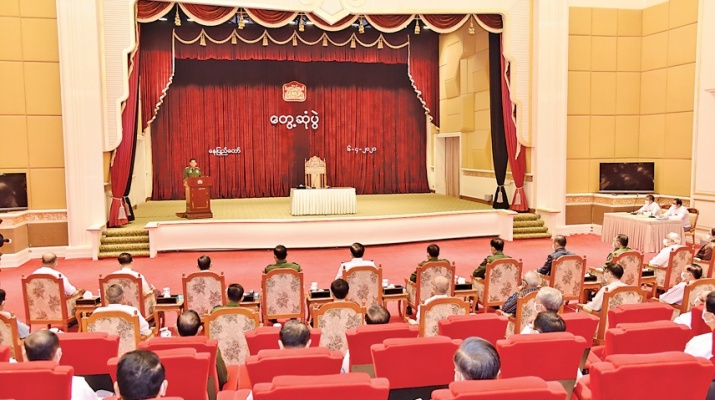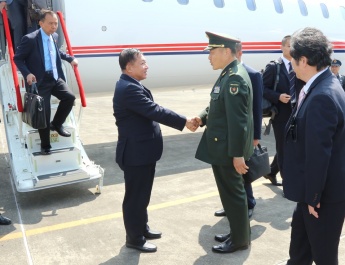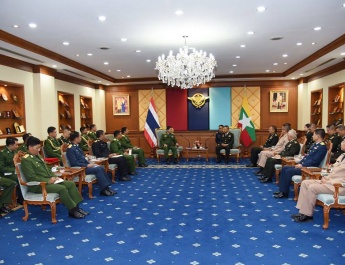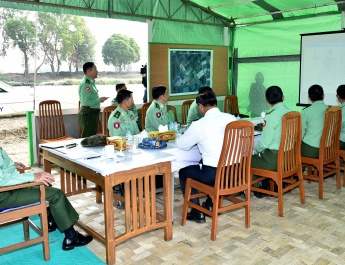Nay Pyi Taw April 6
Chairman of the State Administration Council Commander-in-Chief of Defence Services Senior General Min Aung Hlaing met with union level officials, union ministers, chairman of Nay Pyi Taw Council, chairmen of region and state administration councils and chairmen of self-administered division and zone administration bodies in Thabin Hall of the council office here at 10 am today.
Also present at the meeting together with the Senior General were Vice Chairman of the Council Deputy Commander-in-Chief of Defence Services Commander-in-Chief (Army) Vice-Senior General Soe Win, council members General Mya Tun Oo, Admiral Tin Aung San, General Maung Maung Kyaw, Lt-Gen Moe Myint Tun, Lt-Gen Soe Htut, Mahn Nyein Maung, U Thein Nyunt, U Khin Maung Swe, Daw Aye Nu Sein, Jeng Phang Naw Taung, U Moung Har, U Sai Lone Hsaing, Saw Daniel, Dr Banya Aung Moe and U Shwe Kyein, Secretary Lt- Gen Aung Lin Dway, Joint Secretary Lt-Gen Ye Win Oo, Union Chief Justice U Tun Tun Oo, Chairman of Constitutional Tribunal U Than Kyaw, Chairman of Union Election Commission U Thein Soe, union ministers, union attorney-general, union auditor-general, chairman of union civil service board, governor of Central Bank of Myanmar, chairman of anti-corruption commission, chairman of Myanmar human rights commission, chairman of Nay Pyi Taw council, chairmen of region and state administration councils, members of the advisory board of the SAC chairman, chairmen of self-administered division and zone administration bodies, deputy ministers and officials.
At the meeting, the Senior General said he would explain the declaration of the state of emergency and assumption of the duties of the State by the SAC and work in progress and future programs. It has to assume the duties of the State because of the vote rigging occurred during the 2020 general election.
The country held the general election in 2010, 2015 and 2020.
Union Solidarity and Development Party (USDP) won the election in 2010. It is the first election experience of the country. USDP won the election as there were no major opposition parties. Although NLD stood as the opposition party of that time, it boycotted the election.
After forming the government, the winning party of the 2010 election amended the section 6 (c) of the Political Parties Registration Law, and canceled the section 10 (e) to make way for the multiple party participation in the country’s democracy. NLD took part in the byelection in 2012, and the party chair Daw Aung San Suu Kyi won a seat. She was assigned as the chair of a parliamentary committee.
The then President U Thein Sein excerted utmost efforts in the political, economic, administrative and international relations sectors.
But the problems he was facing were huge. As regards security, there were crisis in Rakhine State, Laukkai in Shan State (North), and Laiza in Kachin State. So, people were not totally satisfied with the then government. NLD won the 2015 general election with the slogan:Time to change.
Public hope for the NLD was high. But Buddhists who represented over 80 percent of the country’s population were unhappy with the NLD because of its administrative blunders in the religious sector. Anyhow, the Tatmadaw cooperated with the elected government. After the election, party leaders including Daw Aung San Suu Kyi held talks with the Senior General on matters relating to the transfer of power. During the talks, the Senior General had stressed the need to act in accord with the Constitution.
But NLD enacted the State Counsellor Law at the parliament.
Reference was made to the section 217 of the Constitution in adopting the law. There were suggestions against the adoption of the said law.
But the Tatmadaw acknowledged the majority vote in accord with democracy. After the law was passed, the State Counsellor was appointed and it was announced that its position was between the President and the Vice President.
The Constitution already has the stipulations in connection with the qualitications of the President and vice presidents. So, it was an act that disobeyed the law. After two or three years, people started to felt dissatisfaction with NLD.
Peace is important in democracy.
President U Thein Sein’s administration started offering an olive branch for the peace process in August 2011. After a period of four years, the government could sign the NCA with ethnic armed organizations.
The NLD government carried out the peace process. The country saw differences in activities of each ethnic armed group and their background history and ideologies.
Peace process requires patience. In the time of the NLD government, some parts of the Union agreementm could be signed. But, progress was not achieved as much as expected in the peace process because the ethnic armed organizations were disheartened by the process.
The Senior General said he called for prioritization of economy as economic growth contributes to the peace process though peace is important. The NLD government received a lot of international aid.
However, there were trade and budget deficits in every fiscal year.
Consequently, ‘no vote’ campaigns were conducted. One example is that only 14 percent of the eligible voters cast votes for the election of the Yangon City Development Committee in 2019. There was only about 4 percent in some townships.
Election is important in democracy.
The Senior General said whenever he met with Tatmadaw families, he encouraged them to vote. The public members were also convinced in news releases that they should not stick to the concept of no vote.
He recalled his speech at the third anniversary of NCA signing in 2018 calling for doing fair and sincere politics. In the next meetings and gatherings also, sincere politics and no political revenge were emphasized to ensure a free and fair election. Covid -19 broke out in 2020. The Tatmadaw understood the adoption of rules and disciplines over election campaigning due to the Covid -19 outbreak. However, organizations concerned favoured the ruling party despite its violation of those rules while other parties faced restrictions. Among the major parties of NLD, USDP and UDP, the last party fielding 1,129 candidates was dissolved for its illegitimacy after investigation.
The Tatmadaw carried out security duties for the people to vote safely in the election. It was found that the NLD committed voting fraud to win the election. After scrutiny, over 10 million of votes assumed to be fraudulent were discovered in 315 townships. Making voter lists bloated is a very terrible act. They could win the election if they were sincere enough. But it is like a student cheating the exam to get highest marks though he could pass easily if he sat for his exam in an honest manner.
Despite calls for addressing the issue, the Union Election Commission didn’t intervene. The Senior General said he immediately agreed on establishment of polling booths of military personnel and families outside the military areas when he was asked. But they didn’t allow the voter lists for those booths outside military areas of the respective townships to be seen. After the new Union Election Commission was formed, voter lists from 98 townships in 10 regions and states were reassessed. There was a difference of about 4 million listed voters when comparison was drawn between the voter list of the township election commissions and that of the immigration department. Over one million voted without having their national registration cards.
When counted, there were over 14 million ballot papers drawn from the 98 townships. But, only nine million were used and five million ballots went missing. The Tatmadaw sent a letter calling for a meeting of the Defence and Security Council to address the fraud. They didn’t and said it was not possible as per the law. The major demand was to postpone the calling of a parliament and to scrutinize the voter lists by a third party organization. But it was rejected. Accordingly, a state of emergency was declared at the acting President’s request, and the Tatmadaw took over State duties. It was not a coup. As it is just a temporary control, the State Administration Council and the government were formed with a majority of civilians. The formation of region/state administration councils follows the suit. And so do the district and township councils.
Any government is responsible for improving the State and giving guarantees.
Protests have emerged since 3 February. Later, protesters came to commit riots, violence, murders, lootings and arson attacks. The Tatmadaw handled the situation democratically. Live bullets were not used and rubber bullets were fired to scare the protesters. In the violent incidents, 16 police members died and over 260 were injured. Such casualties occurred while they severed their duties to ensure the rule of law. Moreover, 248 protesters died and murder cases have been opened for them.
Some protesters used pistols, .22 guns, air guns, grenades, hand-made bombs and other weapons. The media did not reveal the real situation by depicting that protests are being staged in a peaceful manner. Local print media could be controlled.
But online and international news cannot be controlled. The CDM is an act of distorting the State. It should be called country destroyer movement.
Neighbouring countries and the international community also see protests, but there is no act harming businesses. In Myanmar, the CDM is designed to stop hospitals, schools, offices and factories from operating. The Tatmadaw is providing emergency medical treatment to the people. Over 110,000 people came to Tatmadaw hospitals and there were over 35,000 being hospitalized. Currently, over 4,000 are receiving treatment.
Over 6,900 babies have also beendelivered.
The Ministry of Education has been exerting efforts to reopen schools as the failure to reopen schools will hurt the interest of the nation considerably. During the two terms of democratic governments, NGOs and INGOs disseminated inappropriate democratic principles among the government employees.
Hanging the images of monks on lower clothes of women by violent protestors amounted to an insult on the religion. As hospitals have been closed, people have to face difficulties. As such, the Tatmadaw is helping the public as much as possible. When I visited Naga Selfadministered zone with President U Thein Sein in 2015, there were shortages of doctors in the Zone.
Therefore, the Tatmadaw sent 44 officer doctors. When studying the drop-out rates, it was learnt that 1,592,119 students were admitted to schools in 1997 but there were only 34.71 percent of them were left at the fifth standard. Sixty-five percent of students did not reach the fifth standard and only over 17 percent of them were left when they were in the tenth standard.
It was found that the pass rates and the formal education completion rates were very low. One of the reasons for the low pass rate in basic education high school might be the failure to understand the lessons taught in the ninth standard.
Therefore, it could be necessary to review the system of continuous assessment to promote to the next level of standards. Therefore, it is necessary to take measures to enable students to be really educated. As a result, it is necessary to take measures to promote the role of government employees in the education and health sectors and to enable teachers to enjoy appropriate benefits based on their qualifications.
The same is true for doctors and government staffs.
It is necessary to save money as much as possible and adequate amount of funds should be spent on the health, education and security sectors, which are important for the public.
It is necessary to take lessons from the two previous democratic governments. It was found that cash provision was used to win elections and entrepreneurs were involved in corruption when they approached authorities. Therefore, it is necessary for government authorities not to pursue one’s own wishes and to perform duties with complacencyin accordance with the law.
It is important to bridge the gap between the rich, and the poor and the rural and urban areas of the country, to ensure equal development in regions and states, and to achieve the sustainable development of the country to uplift the socio-economic life of the entire country. There are four fundamental requirements of the development of a country including electricity supply, transport, communication and human resources development. Priority should be given to such tasks and it is vital to reopen hospitals and factories and workshops that have been closed.
As economic prosperity plays in important role in international relations, efforts must be made for economic development. As 70 percent of the population of the country is rural people who rely on agriculture and livestock breeding, it is necessary to encourage the development of their livelihoods.
The utilization of resources above and under the ground must be regulated and replantation of forests must be carried out as a national duty through the system in which each and every tree that is planted grows well. Natural resources will be allowed to be exported as valueadded products in the future. It is also necessary to generate more electricity and the permits for the generation of electricity through solar power are being granted. It is also important to cooperate for river water pumping projects for the supply of water for agriculture. It is necessary for relevant authorities to support the agriculture businesses and to take systemic measures for development of the agriculture and livestock breeding sector. As there is only one agriculture university and livestock breeding university, it is necessary to make efforts to open more agriculture and livestock breeding colleges and institutes.
Only when the government serves the interest of the people, the latter will trust the former and it is necessary to take further measures to serve and guarantee the interest of the people.
Although it is required to implement the democracy and federal system but it is also necessary for relevant authorities to raise the awareness of democracy and federalism of the public. Our Three Main National Causes must not be bargained and will a government be recorded in history only when it can carry out tasks to raise awareness for development, stability, tranquility, the rule of law, democracy and federal system during its tenure.
Measures will be taken to expand law and economics degree programs in the respective institutions of higher learning to nurture the greater number of legal and economic professionals. As for the international relations, our country has adopted the independent and nonaligned foreign policy and the peaceful coexistence policy. Therefore, it is necessary for authorities of the states and regions that share border with neighbouring countries to work toward the mutual friendship with neighboring countries. Every country is a friendly country. However, some countries are interfering in the internal affairs of other and it is necessary to be cautious with international relations.





